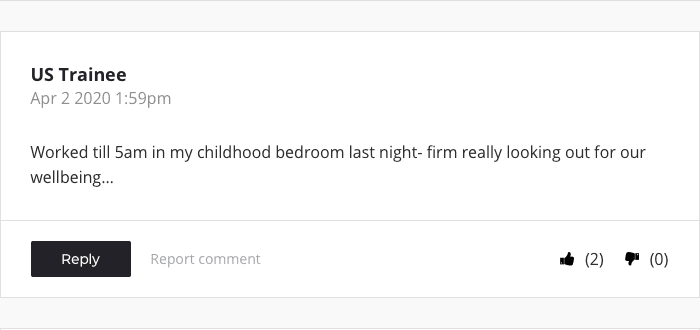Be a magic circle hotshot from your childhood bedroom

We’re living in treacherous times: crashing stock markets, stockpiling and police-enforced lockdowns as the world continues to battle the novel COVID-19 virus.
Our own Prime Minister, Boris Johnson, who recently announced he had contracted coronavirus, the first world leader to do so, has put in place strict social distancing measures to curb the spread of the virus.
We’ve seen a number of law firms heed government advice and implement full remote working policies for their staff. What was previously considered an employee ‘perk’ is now the mainstream and is likely to stay this way for the foreseeable future.
Amid this unprecedented scenario, and the fact we’re still unsure how long the pandemic will last, Legal Cheek has spotted a trend of trainee solicitors heading back to their family homes to work there. It is often said that if you want to do top drawer corporate work the place for that is the City of London, where many global law firms have their bases. Yet, why have rookies flocked from the capital in droves back to mum and dad’s?
The obvious reason is that juniors whom live alone or have no close relatives nearby will need support should they fall severely ill. In these circumstances, family is perhaps best to turn to. In turn, they may want to take care of their elderly parents and grandparents should they be struck with COVID-19 symptoms.
Plus with the capital becoming the coronavirus hotspot (London accounts for the majority of COVID-19 cases and deaths in the UK: 10,247 cases and 1,054 reported deaths at the time of writing) can you blame them for wanting to leave?
On this point one rookie told us:
“I know of a lot of trainees that have decided to relocate out of London. I think there are a few reasons for this: the virus is more prevalent in London, it is harder to get food and supplies here, the City is generally not where you want to be during a pandemic. Standards of living are likely to be higher at the family home where your food will be bought for you.”
They added: “Most trainees live in tiny flats which don’t really allow for working at home — I know of one trainee who has had to buy a chair and desk!”
One insider said they simply do not have the means to print reams of documents from their flat share so heading to their parent’s place which has a spare room, a printer and suitable office equipment (as well as “peace and quiet”!) seemed the obvious move.
Another told us that trainees and even associates are heading back home to work from home well, because they can. Technology in place at most corporate firms means they can log in to work wherever, whenever. Whether that’s from the garden or your parent’s living room.
We reached out to Irwin Mitchell junior associate and vlogger Chrissie Wolfe for her take on things.
“Everybody works differently and it massively depends on your home situation too. Many junior lawyers may well still be house-sharing and if everyone is house-bound it may be more difficult to work there,” the ‘Law and Broader’ YouTube star told us. “Also, for some people it may be cheaper to take advantage of moving to your parents for a few weeks and there may be more space/privacy there as well depending on your normal living situation.”
Wolfe added:
“I would have gone to my parents if I could but they are isolating and in a high risk category so I have taken the decision to stay at my home. I live on my own so, personally, I would prefer to be around family rather than completely alone. I still have a desk set-up in my room at home from where I used to revise for exams but I don’t have the same set-up in my home as I have never worked remotely until now!”
Legal YouTube star and Linklaters trainee solicitor Eve Cornwell left London prior to the lockdown and returned to her family home in the North West.
“I know that I’m going to be so much better with my family right now rather than in an apartment by myself, and so because of that we gotta take steps… to protect myself, to protect my family, to protect my mental health to ensure that I still am working efficiently at my job. There’s just so many things to take into consideration that I guess I kinda forgot would be important to take into consideration,” she tells viewers in a vlog posted to her channel last month.
Cornwell then proceeds to pack up her home office set-up is picked up by her father (house plants in tow!) to make the four-hour journey home.
Like Links, a magic circle firm, others have accommodated trainees wanting to work from home further afield, and even abroad. A spokesperson at Allen & Overy told us: “We are supportive of trainees working from home abroad during this time, subject to relevant regulatory and other requirements.”
Other junior lawyers haven’t been so fortunate.
There appears to be a discrepancy in how some law firms are applying their ‘work from home’ policies during the lockdown. We’re told some prevent trainees from going home to areas outside of England, Scotland or Wales, or internationally, which impacts trainees living further afield disproportionately.
A request by one City trainee to work remotely overseas, to be with their parents who were displaying symptoms of the virus, was denied because the firm said they should be able to return physically to work within a reasonable time. They were given the option to take unpaid leave.
In another instance one rookie said their request to work from their family home outside Europe was denied. This came despite them offering to work to UK hours and their home country’s government urging its citizens to return. They claim they weren’t stopped from going so long as they took unpaid or annual leave for the entire duration of the stay. Given the uncertainty that surrounds the current COVID-19 crisis, this could mean they would have to stop working for an unknown, and perhaps lengthy, period of time. Legal Cheek understands taking a lengthy period of unpaid leave could affect overseas trainees’ work visas.
“This was in essence no real choice at all. I am being forced to choose between being able to work and my future career, and my own health, safety and wellbeing,” the trainee told Legal Cheek. “To put it bluntly, the firm was all too willing to risk my health and safety. This was despite there being a clear option which would allow me to continue working in a safe environment.”
“The firm has chosen to apply a one-size-fits-all policy to every single trainee who raises such a request, without considering their personal circumstances,” they continued. “For such a one-size-fits-all policy to be a fair one, the population that it is being applied to must be homogeneous.” That’s a knock-back to diversity, the rookie said, explaining: “to retain a diverse pool of talent, [a firm’s] policies have to be rooted in flexibility.”
We’ve been forced somewhat to adopt new ways of working amid the current circumstances but it’ll be interesting to see what, if any, measures influence the future of legal practice. Digital dependancy is likely to last for the foreseeable future; so that technically means you could be a magic circle hotshot from your childhood bedroom.

For the latest news, commercial awareness insight, careers advice and events:
Sign up to the Legal Cheek Newsletter

